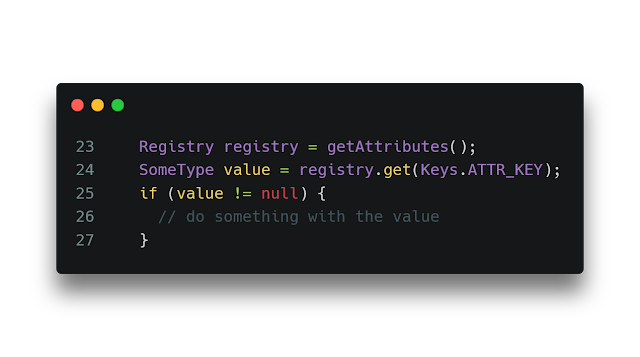Typesafe registry of key-value pairs
Have you ever seen or used this pattern of code:
It stroke me then how often I have I seen just this pattern appear and re-appear so many times that I have all but stopped thinking about it.- "Of course, if you need an extensible registry of values, you use a
And usually you either engineer your registry around same type of objects or you throw the generic typesafety out with a proverbial bathwater and map your keys (usually of the type
Would'nt it be nice if we could actually make key-value pairs themselves be type-safe?
One day I got thinking, what would be needed to make this possible.
Given the following general interface:
We could re-write the snippet in the beginning as follows:
Although the difference is not all that huge, the last snippet looks much cleaner and the meaning is much easier to read and understand.
Also, as I've learned to associate explicit type casts with a potential code smell, the latter snippet has a much cleaner feel to it. I know exactly what type of the value I am getting from the registry and the API contract ensures that I will always get the type of the value I am asking for.
To test out this idea, I've started a little project on GitHub. Check it out and let me know what you think...
It stroke me then how often I have I seen just this pattern appear and re-appear so many times that I have all but stopped thinking about it.- "Of course, if you need an extensible registry of values, you use a
Map of key-value pairs (or a Dictionary)".And usually you either engineer your registry around same type of objects or you throw the generic typesafety out with a proverbial bathwater and map your keys (usually of the type
String) to values of type, well .. Object.Would'nt it be nice if we could actually make key-value pairs themselves be type-safe?
One day I got thinking, what would be needed to make this possible.
Given the following general interface:
We could re-write the snippet in the beginning as follows:
Although the difference is not all that huge, the last snippet looks much cleaner and the meaning is much easier to read and understand.
Also, as I've learned to associate explicit type casts with a potential code smell, the latter snippet has a much cleaner feel to it. I know exactly what type of the value I am getting from the registry and the API contract ensures that I will always get the type of the value I am asking for.
To test out this idea, I've started a little project on GitHub. Check it out and let me know what you think...




Comments